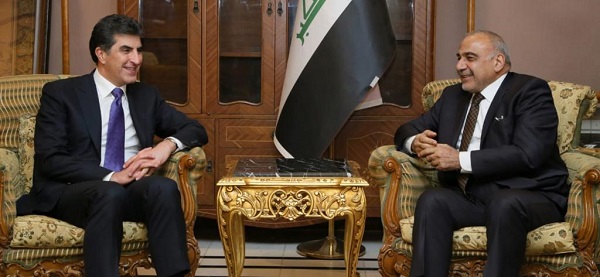Alwaght- Iraq’s entry to the post-ISIS period has seriously transformed the course of the political developments in the country. Meanwhile, the relations between Kurdistan Regional Government (KRG) and the central government have undergone an even more serious transformation, pushing the political analysts to note that just unlike pre-2014 Iraq, the Kurds now cannot flex their muscles to Baghdad in any negotiations to settle the existing disputes.
Over the past few months, the Iraq cabinet under Adel Abdul Mahdi and the Kurdish cabinet under Masrour Barzani intensified the efforts to settle the problems still disturbing their bilateral ties. There are news reports that they could reach the grand agreement within the next 45 days. Nechirvan Barzani, the president of the KRG, during a visit to Washington on Tuesday, raised the issue with the American officials who reportedly voiced the White House support to such an agreement.
The fact is that the Kurds’ issues with the central government are not limited to the present conditions. Rather, they have their roots in post-2003 Iraq. Since then, a set of cases remained unsettled with Baghdad.
Roots of division and tensions between Baghdad and Erbil
In the years following 2003, the year the US invaded Iraq and toppled Saddam Hussein, and particularly after approval of the constitution in 2005, the two sides failed to reach agreement on a set of issues. Now with the joint will showed by Abdul Mahdi and Barzani, the two sides seek to solve their problems. Here are some of them:
Article 140 of the constitution, known as the article on the disputed regions: Certainly, one of the main sources of dispute between Baghdad and Erbil since the new constitution was approved has been the disputed regions. The disputed regions, referred to by article 140, cover parts of Mosul and Salaheddin, and Diyala, as well as the whole of Kirkuk. The regions together account for 14 percent of the total Iraqi territories. The Kurds in the north lay claim on them and assert that they underwent demographic changes under an organized “Arabization” campaign. So, their rule has to be determined under a referendum according to the constitution. The Kurdish leaders, lost Kirkuk to the Iraqi forces on October 17, 2017, following the independence referendum, now seek to persuade Baghdad officials to allow the Kurdish Peshmerga forces to re-deploy in Kirkuk and agree to article 140 adoption.
Natural resources and oil exports: Another sticking point between Erbil and Baghdad is the oil exports. Over the past decade, the Kurds struggled to sell their oil independent from Baghdad. But the central government pressed for northern oil exports by the State Organization for Marketing of the Oil (SOMO). So far, the Kurds have rejected to concede to all of their oil resources going under Baghdad control. In the fresh talks, it seems that this issue will get part of their focus.
Security and budget matters: Another blockade to a settlement to the Erbil-Baghdad disputes is the budget and security issues. The central government, under former PM Nouri al-Maliki, in 2013 cut off the payments to the state employees in the Kurdish region. This continued until Abdul Mahdi took the office in early October last year. The Kurdish leaders are asking Baghdad to hand them over the KRG annual budget share, which is 17 percent of the national budget and has been delivered to them since 2005. But Baghdad offers them about 12 percent. The two sides are expected to seek agreement in security and budget sectors as they show new approach to dialogue.
Prospects for a big agreement
Although at present the bilateral talks are pursued more seriously than any other time, the reality is that just unlike the past the Kurdish government has gotten limited instruments to foist its demands on Baghdad. The Kurds now are not in control of the oil-rich Kirkuk, not backed as in the past diplomatically and economically by neighboring Turkey, lack the unity inside their own politics as the two leading parties Kurdistan Democratic Party (KDP) and the Patriotic Union of Kurdistan (PUK) are in a constant power struggle, and their figures and representatives in Baghdad have seen clout shrinkage over the past two years.
Aware of its big weaknesses in the face of Baghdad, Erbil now turns head to Washington to press the central government for concessions and a showdown agreement. However, what looks certain is the fact that the Kurds lack the power to impose their word on Baghdad. It seems that only if they suspend part of their big demands, there will be a chance of a dispute-ending agreement.



























